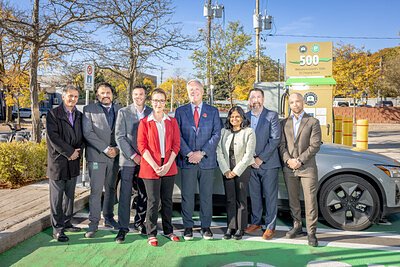
Toronto Powers Ahead: 500 EV Chargers Mark City’s Leadership in Electrification
Toronto’s ambitious EV charging network hits a milestone, but can the infrastructure keep pace with growing demand? We examine the partnership driving innovation and the future of urban mobility.
Toronto Powers Ahead: 500 EV Chargers Mark City’s Leadership in Electrification
Toronto, ON – November 1, 2025 – Toronto has reached a significant milestone in its journey towards a sustainable transportation future with the energization of its 500th electric vehicle (EV) charging station. A collaboration between the Toronto Parking Authority (TPA) and Toronto Hydro, this achievement positions the city as a frontrunner in EV infrastructure development, but also raises questions about maintaining pace with escalating demand.
This latest station, located at Green P Carpark 504, represents a key component of Canada's largest municipally-owned EV charging network. The partnership, which saw Toronto Hydro initially spearhead the installations before transferring ownership to the TPA in 2023, has resulted in a robust infrastructure aimed at alleviating “range anxiety” and encouraging EV adoption.
“Our mission is clear: to create a seamless mobility experience that delivers on Choice, Ease, and Speed,” said a TPA spokesperson. “This milestone is a testament to our commitment to providing accessible and convenient charging options for EV drivers.”
A Model for Public-Private Partnership
The success of the TPA-Toronto Hydro collaboration offers a compelling case study for other cities looking to accelerate EV infrastructure development. Unlike purely private charging networks, this partnership leverages the TPA’s existing parking infrastructure and Toronto Hydro’s expertise in electricity distribution, creating a scalable and efficient solution.
“The public-private model is particularly effective because it combines the resources and expertise of both sectors,” explains an energy industry analyst who wished to remain anonymous. “The TPA has the land and the customer base, while Toronto Hydro has the power grid and the technical know-how. It's a natural synergy.”
Toronto’s approach differs from many U.S. cities that are heavily reliant on private charging networks, often resulting in uneven distribution and accessibility. The municipal ownership allows Toronto to prioritize public access and integrate charging stations into existing urban planning strategies.
Keeping Pace with Demand
While the 500-station milestone is impressive, the rapid growth of EV adoption presents a continuous challenge. According to Statistics Canada data, EV registrations in Toronto are steadily increasing, putting pressure on the existing charging infrastructure.
“The network is currently adequate, but it's crucial to anticipate future demand,” warns an urban mobility expert. “We need to ensure that the charging infrastructure can keep pace with the growing number of EVs on the road.”
Toronto Hydro is already planning for the future, with plans to add another 4,000 charging stations by 2025. This expansion will require significant investment in grid upgrades and smart charging technologies.
“We’re committed to ensuring that the electricity grid can support the growing demand for EV charging,” stated a Toronto Hydro representative. “We’re exploring innovative solutions, such as demand response programs and energy storage, to optimize grid performance and reduce costs.”
User Experience and Accessibility
Beyond sheer numbers, the user experience is critical to encouraging EV adoption. Online reviews of TPA charging stations consistently highlight the convenience and reliability of the network. Users appreciate the integration with parking facilities and the ease of use of the charging process.
“The charging stations are well-maintained and conveniently located,” said one EV driver in a recent online review. “It’s a hassle-free experience, which is exactly what EV drivers need.”
However, some experts caution that accessibility remains a concern. While Toronto’s charging network is relatively well-distributed, there are still gaps in coverage, particularly in underserved communities.
“It’s important to ensure that EV charging infrastructure is accessible to all residents, regardless of their income or location,” says an urban planning consultant. “We need to prioritize equitable access to charging stations and address the needs of communities that may not have access to home charging.”
The Future of Urban Mobility
Toronto’s ambitious EV charging network is more than just infrastructure; it’s a statement about the city’s commitment to sustainability and innovation. By investing in EV infrastructure and fostering public-private partnerships, Toronto is positioning itself as a leader in the transition to a cleaner, more sustainable transportation future.
“The electrification of transportation is inevitable,” says a policy analyst specializing in urban mobility. “Cities that embrace this change and invest in the necessary infrastructure will be best positioned to thrive in the years to come.”
As Toronto continues to expand its EV charging network and explore innovative solutions, it will serve as a model for other cities looking to accelerate the transition to a more sustainable urban mobility ecosystem. The challenge now lies in maintaining momentum, addressing equity concerns, and ensuring that the infrastructure can keep pace with the ever-growing demand for EV charging.
Key Takeaways:
- Strategic Partnership: The collaboration between TPA and Toronto Hydro is a model for accelerating EV infrastructure development.
- Growing Demand: Toronto’s EV charging network is facing increasing pressure from growing EV adoption rates.
- User Experience: Accessible, convenient, and reliable charging stations are crucial to encouraging EV adoption.
- Equity Concerns: Ensuring equitable access to EV charging infrastructure remains a challenge.
- Sustainable Future: Toronto’s investment in EV infrastructure positions the city as a leader in sustainable urban mobility.
